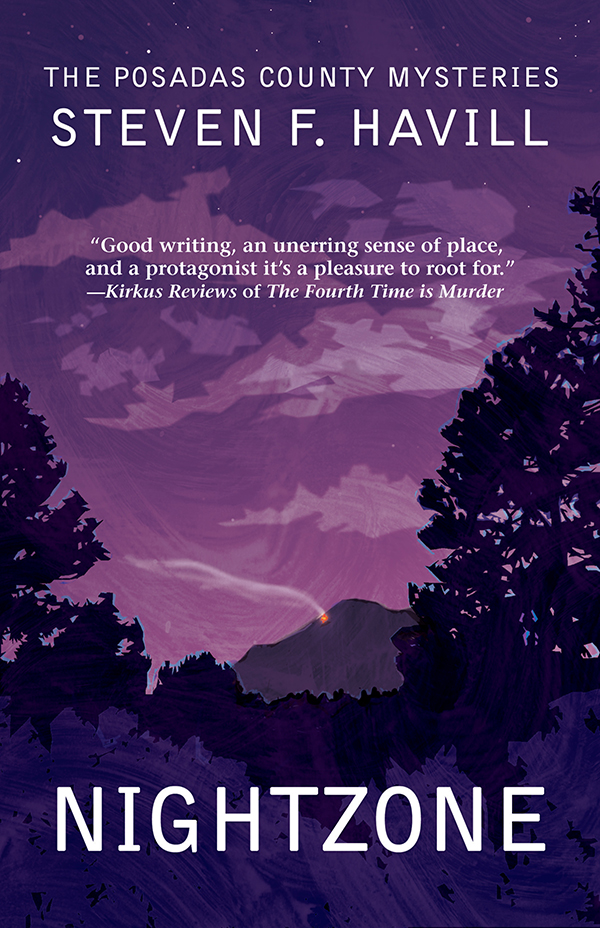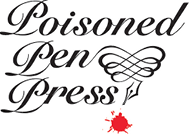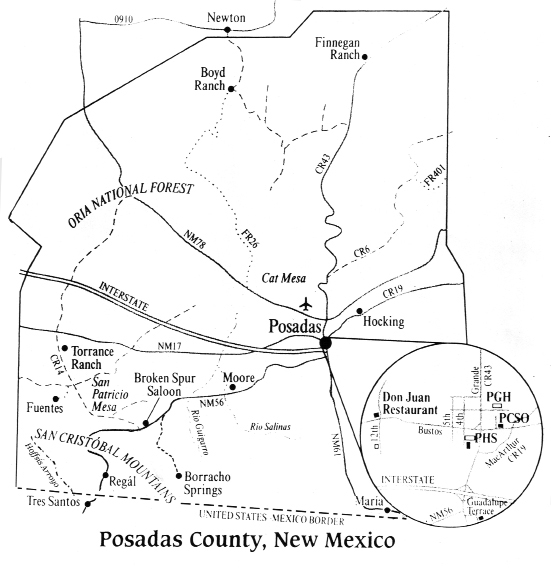Nightzone
Authors: Steven F Havill


NightZone
A Posadas County Mystery
Steven F. Havill
Poisoned Pen Press

Copyright © 2013 by Steven F. Havill
First E-book Edition 2013
ISBN: 9781615954244 ebook
All rights reserved. No part of this publication may be reproduced, stored in, or introduced into a retrieval system, or transmitted in any form, or by any means (electronic, mechanical, photocopying, recording, or otherwise) without the prior written permission of both the copyright owner and the publisher of this book.
The historical characters and events portrayed in this book are inventions of the author or used fictitiously.
Poisoned Pen Press
6962 E. First Ave., Ste. 103
Scottsdale, AZ 85251
Contents
To Kathleen
There were several reasons why it made perfect sense to sit on the rim rock of a towering mesa in southwestern New Mexico at one o'clock on a February morning, wrapped in a musty old army blanket and sipping powerful coffee from a chipped ceramic mug. Maybe overly zealous border patrol officers do something similar during stakeouts. Or elk hunters, waiting to hear the first secretive shuffles of a bull elk's hoof. I fit neither category.
Long ago, I had learned that it never worked to toss in bed, twisting sheets in knots while trying to chase away my chronic insomnia. I wasn't one to pop pills or swig hot milk and honey or read a boring book. I couldn't stand the idiocy of late night television. But, on the rim rock of Cat Mesa in the crystalline air, with a panoply of stars from horizon to horizon, I could snuggle down against the limestone boulders that had spent the day soaking up the sun's warmth. Without interruption, I could ponder great thoughts, watching my county far below.
Sometimes I would even doze off for a few moments. But if my brain wouldn't allow sleep, the least it could do was entertain me by chewing on a couple of interesting tidbits.
For instance, a few days before, while I was trudging across the prairie twenty-five miles southwest of Posadas, one of my hobbies had paid off in spades. I liked to imagine that I was an observant old fart, but until that moment I hadn't been the lucky sort who could look down and pluck every damn flint arrowhead out of the prairie matrix, or find an unbroken Puebloan water jug snuggled in a cave. I didn't even find dimes on the sidewalk.
But this time, hiking an interesting section of Bennett's Trail and looking for signs of that dysfunctional pioneer family who had tried to bring large-scale cattle ranching to this tough country, I struck gold. Cresting a knoll, I had tripped over a loose rock, shot out a hand for balance, and there it wasâa loaded, cocked Colt Single Action revolver, nose down in a narrow fissure.
For a dozen ragged breaths, I had just stared without touching. And then, like any good cop would, I slipped the simple little digital camera out of my pocket and took half a dozen photographs. I could savor the anticipation only so long, and I didn't even consider the dictum from archeologists and federal agencies about leaving artifacts in place. This was private property, and the owner had given me carte blancheâfinders keepers. Slipping on one of my leather gloves, I wrenched the artifact out of place.
A graceful, lethal work of art when first manufactured, the handgun was now just a lump of heavily corroded steel. It had rested under the stars, sun, snow, and rain for more than a century, caught in the cleft of rocks.
My mind had instantly conjured a theory about who the gun's owner might have been, and why he managed to fire one shot but no more, leaving four cartridges locked in place by corrosion, the cylinder itself a useless, immobile lump. After more than thirty-five years as a lawman, I knew better than to become too attached to the first theory that shows its face. The gun could have been dropped by anyoneâa Mexican national skewered by an Apache's arrow while hiking to a new life in New Mexico Territory; a wagon driver not paying attention as the gun worked its way out of his hip holster; a family drama where one man drew on another, shots were traded, and the Colt fell into place, dropping from a lifeless hand. That's the one that appealed to me, since I knew the legend that Josiah Bennett had been murdered by his own son-in-law. The legend contended that an axe had cancelled Josiah's dreamsâmaybe he'd managed only a single shot in self-defense.
To a local history buff like me, the discovery of the gun and all it meant was enough to trigger a legendary dose of insomnia. The evening after I'd found the relic, I'd read myself red-eyed, researching everything Colt from my own voluminous library. Because older Colts had their serial numbers stamped in three places on the frame and grip straps, I was able to scrape off enough rusted crud to piece together the number, a digit from here, a digit from there. The gun was manufactured in 1889. A letter to Colt's archives would find out to whom the revolver was originally shipped. That reply would take months, agony for a man who no longer purchased green bananas.
Confronted with a challenge, some folks pace the floor. Some chew fingernails. Some eat or smoke. I find a comfortable vantage point heavy with peace and quiet and let my mind wander through its files. What better reason to drive out to Posadas County's vast collection of the boonies, take the short walk to this vantage point, and gaze out across the night landscape that had so challenged the Bennetts a hundred years before. But that puzzleâthe gun, the Bennett family, and their fateâwas only one motivation for my trek to the rim of Cat Mesa.
In addition, my thoughts whirled around to what now was referred to in the family as
The Concert
. Not
my
blood family, of course. My four kids, now grown and deep into middle age, were scattered across the country, doing their own thing. One of them, my oldest daughter Camille, managed to call me too often, fretting that I was not doing enough to reach some ridiculous benchmark of old age.
The Concert
burst upon my adopted family, the Guzmans, like a prairie fire. Like everyone else in town, I was in the blissful dark about the whole matter until two weeks before, when the first glossy posters went up. The posters appeared in several strategic spots, announcing that at 8 o'clock on Saturday night, February 9, my godson, Francisco Guzman, along with a conservatory chum, Mateo Atencio, would be hosted in concert at the high schoolâ¦a
big
concert. An
event.
The photo displayed on the poster was professional, showing the thirteen-year-old Francisco looking mature and perfectly decked out in black, one arm resting on a polished grand piano's keyboard. The slightest of smiles touched his lips, guaranteed to set young ladies' hearts pitty-patting. Standing just behind him, holding a brilliantly polished silver flute, was a lad I'd never met. Mateo Atencio could have been Francisco's older brother. Two kids, both prodigies, too young to drive themselves to the concert.
The issue wasn't that the two kids would put on a concert. That's what talented musicians
do,
and even some who aren't so talented. But genius or not, Francisco R. Guzman was but thirteen, very minor indeed. Granted, the residential conservatory that he attended in Edgarton, Missouri, stood
in loco parentis.
Butâ¦had young Francisco discussed this event with his parents? No. Dr. Francis Guzman and Posadas County Undersheriff Estelle Reyes-Guzman had learned about the concert when the high school music teacher, Jerry Reader, had presented to them a proof of the poster in questionâsomething he at least had the courtesy to do
before
the posters went up. The posters prompted a predictable reaction, since both Francis and Estelle were somewhat old-fashioned about such things and believed that parents still gave direction and permission to thirteen-year-olds.
Being the good detective that she was, Undersheriff Estelle Reyes-Guzman soon delved into the heart of the matter. Jerry Reader, the high school music teacher, had been contacted originally by a Professor Hal Lott from the Leister Conservatory, where the two boys lived and studied. Reader told Estelle that it was his understanding that such concerts were a requirement for senior performance majors at the schoolâwhich, at thirteen and fifteen years of age, the boys both were. Promises of concerts were not given in advance, since student populationsâeven those made up of gifted studentsâchanged frequently.
But in typical fashion, Francisco had requested of Mr. Reader that news of the concert should be a surprise until posted, and not to breathe a word to the Guzmans. In his own youthful exuberance and ignorance, the notion had never crossed the boy's mind that his parents might
enjoy
a few twangs of anticipation. Fortunately for him, Jerry Reader had shown the poster proof to Estelle before it was splashed around town.
The undersheriff's next call was to Professor of Music Hal Lott, MA, MFA, PhD, and so forth. I would have liked to have listened in. Estelle would have been courteous enough, but her voice would have carried overtones that would catch Dr. Lott's attention. The good professor had explained everything, offered an apology, and maintained that he was as excited about the concert as the boys. He pointed out to Estelle that public recitals and performances of all sorts were a vital part of the young musician's education. The school, Professor Lott said, would take care of transportation, with professional drivers, two professors in company, the two young musicians, and ten student stagehands traveling in a massive RV appropriate to a rock star, in company with a well-maintained stretch van.
As a cop, I had hated vans, since I'd seen more than a few of them reduced to a collection of bent and torn parts, strewn down the highway. I was sure Estelle had shared some of those same concerns. But in due course, the details of the concert had been finalized.
The high school teacher, Jerry Reader, had fretted to Estelle about the condition of the school's piano. Estelle had suggested to him that he fret to Dr. Lott, which he did. He was told not to worryâthe staging truck would follow the RV and the van, and its principal cargo was a mammoth Steinway. These guys didn't mess around.
Reader, who had never had the pleasure of trying to teach Francisco Guzman before the boy left public for private schooling, was giddy with delight. He might have experienced gifted students during his career, but never a true prodigy, never a youngster who had been featured, at age eleven, in a major national magazine after a triumphant concert in Los Angeles.
Promising further significant musical surprises that he wasn't at liberty to divulge, Professor Lott was able to add Posadas, New Mexico, a tiny village shrunken to fewer than 3,200 folks, to his list of venuesâ¦in the high school gymnasiumâa place with acoustics much like a parking garageâ¦and Reader was told not to worry about that, either.
Estelle had spent an hour on the telephone with her son, and found out a few more details, including that at least two major pieces of music composed by the youngsters themselves would be debuted at the concert. This performance would be followed a week later by a similar concert in the tiny village of Dos Pasos, Texas, Mateo Atencio's hometown. Further “surprises” Francisco refused to divulge.
What a little wart,
I thought. True enough, Francisco Guzman was a genuine, critically acclaimed prodigy whose concerts up to this point had been numerous and well-attended. He'd kept his proud parents busy, traveling to venues as far away as Chicago, St. Louis, Philadelphia, and of course, the Big Apple, where he'd appeared on some public television feature. But as far as I could tell, the rave reviews and all the doting hadn't gone to the boy's head.
When I saw him at home during breaks from school, he was the same kid I'd known since his birth. He loved monkeyshines with his little brother, Carlos. He could cook up waffles that almost floated in the air, or green chile lasagna that just about reduced me to an over-eater's coma. And, being a prodigy, he would play piano for four or five hours at a stretch, until the sweat soaked his black hair and dripped from his chin. A short break to take a shower and gobble calories, and he would dive into another session.
As I sat on my rock pondering the logistics of all of this, I supposed that a hometown concert was logicalâand long overdue. Maybe Leister masters handled this gig as a matter of course for young musicians of such prodigious talent that they surely would end up belonging to the ages. The staggering tuition the place charged should certainly cover itâ¦that and the whopping thirty-dollar admission price.
I had offered to host the traveling faculty and stage crew at my spacious old adobe, and hoped that I'd have the chance to engage Master Professor Doctor Lott in conversation. Francisco and Mateo would take the bunks in Francisco's room at the Guzman's modest little place on 12
th
Streetâthe fate of western world music nested in a couple of knotty pine bunk beds.
Those were the thoughts running through my mind as I lounged on the rim rock of Cat Mesa that February nightâ¦musings about an old, rusty, worthless revolver plus excruciating anticipation four days before
The Concert
.
So preoccupied was I that I almost missed the two pops of harsh, white light that blinked through the uniform darkness of the southwestern prairie, tiny flashbulbs too distant for me to judge cause or detail. Had I been caught in a sidelong glance, I would have missed them. But they were enough to bring my mind into sharp focus, since the empty prairie doesn't pop with light for no good reason.
I held my breath, straining my eyes, hoping for more. The two sharp flashes had been far to the south, the angle putting them at least twenty miles away, a distance where even a pair of headlights would be mere pin pricks in the night, not bright jolts of light.
The old cop in my system awakening, I pushed myself off the Oldsmobile-sized boulder that had been my sofa and stood carefully. Inky space yawned in front of my grandstand on the mesa rim. No distant whump of an explosion or gunshots reached me as I listened, only the lightest whisper of night breeze exploring through the canyons and cliffs.
Watching my footing, I made my way back to the SUV parked in the juniper grove behind the rim. With the ten-power binoculars rescued from the avalanche of crap on the SUV's center console, I returned to the mesa rim and once more settled on the limestone boulder, knees drawn up close. Training the glasses south, I had a thousand-foot elevation advantage over the prairie. The great dome of a trillion stars ended abruptly behind the rise of the San Cristóbal Mountains marking the border between Posadas County and Mexico. The lights had flashed against a black blanket. They hadn't been my imagination.
